Last updated: September 2025
For many renters in Georgia, the expectation that you must show traditional proof of income—such as W‑2 pay stubs or a long paycheck history—can feel like a wall. Gig workers, freelancers, students, new arrivals and those in temporary roles may have the means to pay but struggle to prove it with conventional paperwork. If you’re trying to rent in Georgia without proof of income, clear, accurate documentation and presentation matter.
FinancialDocsProvider.com helps bridge that gap. We specialise in formatting, organising and presenting your existing financial records so landlords, lenders and screening services can assess your real financial picture without any misrepresentation. Our compliance‑first approach delivers clarity while staying firmly within legal and ethical boundaries.
In this guide, you’ll learn whether renting without traditional proof of income is possible, how US, UK and Canadian rules shape application requirements and which edits to documents are permissible. You’ll also see accepted alternatives, scenario‑based examples and best practices for packaging your information so property managers can confidently approve your application. We close with our process, a detailed checklist and answers to common questions.
Related Entities & Terms
- Proof of income documents: W‑2, 1099, T4 (Canada), Notice of Assessment (NOA), SA302 (UK), payslips
- Regulators: Consumer Financial Protection Bureau (CFPB), Federal Trade Commission (FTC), Internal Revenue Service (IRS), Financial Conduct Authority (FCA), Financial Consumer Agency of Canada (FCAC), Canada Revenue Agency (CRA)
- Forms: Tax returns, bank statements, pay stubs/payslips, offer letters, profit‑and‑loss statements, employment verification letters
- Programs: Housing Choice Voucher, Section 42 Tax Credit (US), Housing Benefit (UK), Canada Mortgage and Housing Corporation (CMHC)
- Other terms: tenant background checks, income limits, fair housing, co‑signer, guarantor
- State and provincial agencies: Georgia Department of Community Affairs (DCA), DeKalb County Housing Authority, Ontario Landlord and Tenant Board
- Landlord screening providers: AmRent, TransUnion SmartMove, credit bureaus
If you’re looking for help with editing or formatting your documents, explore our proof of income editing services or read about our pricing.
What are the legal basics of renting without proof of income?
Renting in Georgia without conventional pay stubs is possible. The key is understanding what landlords can ask for and how tenant‑screening rules work. There is no Georgia statute requiring W‑2 pay stubs specifically, but most property managers will verify your ability to pay using lawful screening methods.
Landlords often rely on consumer reports governed by the Fair Credit Reporting Act (FCRA). With your consent, a screening company may report employment and income history, credit data and housing‑court records. You have the right to review those reports and dispute inaccuracies. In the UK, letting agents must conduct “Right to Rent” checks focused on immigration status; they commonly request payslips and bank statements to assess affordability. In Canada, landlords may ask where you work, review your credit and request proof of income as part of the rental process.
Affordable housing programs operate under different rules. The Georgia Department of Community Affairs updates income limits for tax‑credit properties annually. For 2025, new Multifamily Tax Subsidy Projects limits took effect on April 1, 2025, with implementation required by May 16, 2025. If you are applying for a subsidised unit, ensure your household income meets published thresholds and that all information you submit is accurate.
So, can you rent without traditional proof of income? Yes—if you demonstrate ability to pay with alternative documentation. Many landlords accept bank statements, recent tax returns, employment offer letters, pension statements or a guarantor. The winning formula is transparency plus consistency. Never fabricate or alter financial data; doing so risks eviction, legal consequences and long‑term credit damage.
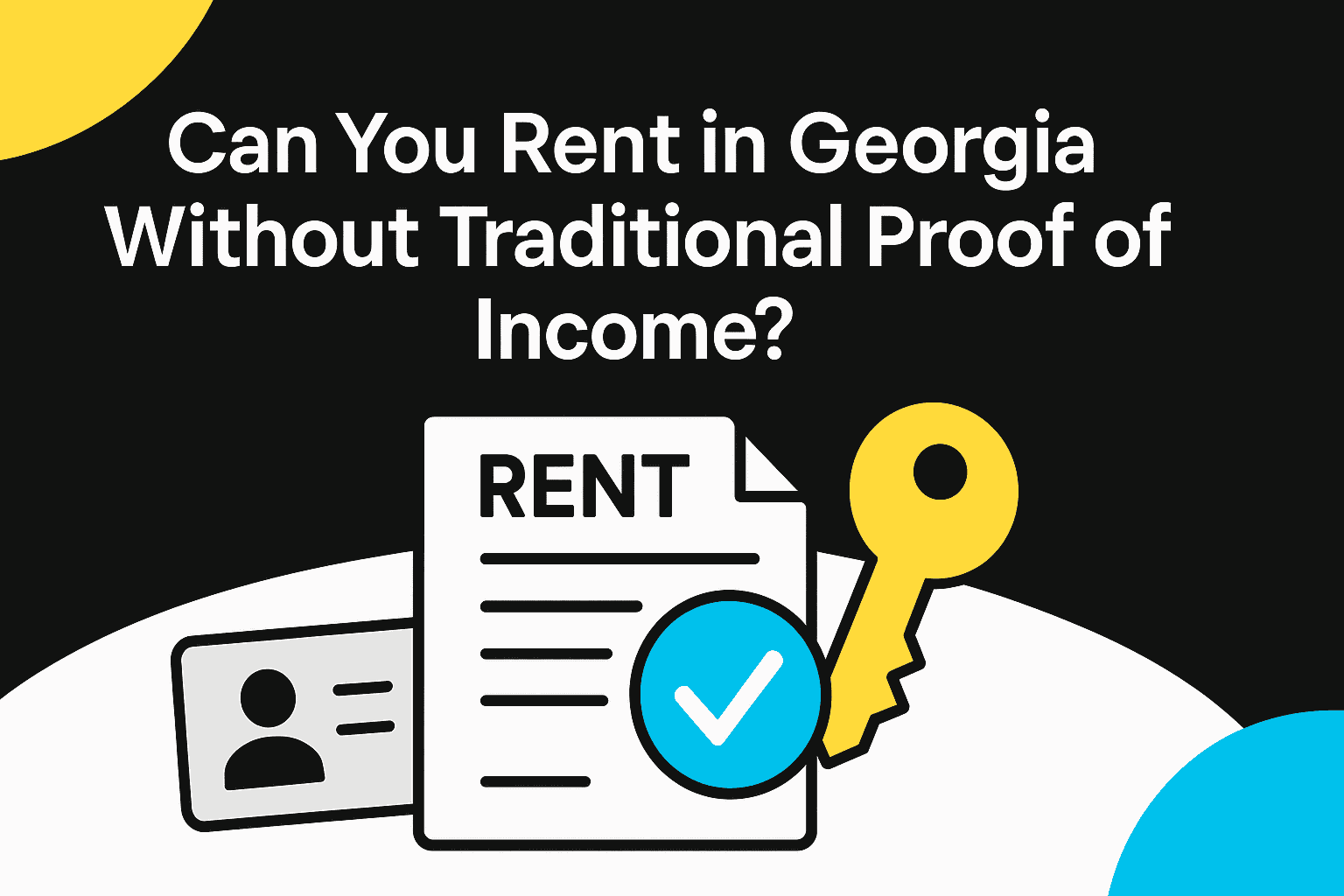
Understanding these frameworks explains why landlords ask for certain documents and how to prepare a compliant application even when you do not have conventional pay stubs.
Which edits are allowed?
Editing for clarity, privacy and readability is permissible. You can restructure, redact and annotate your documents so long as the underlying facts remain intact. Improving legibility is not the same as changing income.
For example, you can:
- Redact personal identifiers. Remove Social Security numbers or account numbers before sharing bank statements. This protects privacy while preserving income figures.
- Reformat PDFs. Convert awkward downloads to standard A4 or US Letter, straighten scans and merge pages into a single, orderly PDF.
- Highlight key numbers. Use callouts to direct attention to gross pay, net pay or average monthly deposits. Annotations should never alter the numbers.
- Translate or transcribe. Replace obscure payroll codes with a plain‑language legend so reviewers can understand each field.
- Package documentation. Combine bank statements, tax returns and letters into a labelled packet with a one‑page summary.
At FinancialDocsProvider.com, we focus on these compliant adjustments. We clean scans, export crisp PDFs from payroll portals and consolidate multi‑page statements. We never modify wages, dates or balances—only presentation—so landlords, underwriters and automated screening tools can evaluate your file quickly. For more examples, see our article on creating pay stubs for apartment rentals.
What document alterations are illegal?
Edits cross into fraud when they change facts. Altering income amounts, dates, payer names or employer details to mislead a landlord or lender is unlawful and risky. Consequences can include application denial, lease termination and civil or criminal penalties.
Screening firms and landlords compare information across sources. They examine pay stubs, bank deposits and tax returns, and may verify employment or contact a payroll provider. Fabricating income on a pay stub, shifting deposit dates on a statement or swapping an employer name can be flagged as forgery or identity fraud.
Common illegal edits include:
- Changing numbers. Inflating gross or net pay, tax withholdings or account balances.
- Backdating documents. Re‑dating a pay stub, tax return or bank statement to meet a time window.
- Inserting fictitious transactions. Adding fake deposits to mimic steady income.
- Using someone else’s documents. Submitting another person’s pay stubs or returns, which can constitute identity theft.
- Altering employer details. Editing an employer’s name, EIN or address to obscure employment status.
The line is bright: you may improve appearance and organisation, but you may not change facts. FinancialDocsProvider.com refuses any request to alter income figures, dates or parties. We edit for clarity, legibility and order—nothing else.
When do you need professional document formatting?
Not everyone fits the salaried‑employee template. Self‑employed professionals, gig workers, students, newcomers and retirees often have non‑traditional documentation. Professional formatting helps connect the dots, reduces back‑and‑forth and speeds decisions.
Below are common scenarios across the US, UK and Canada—and practical ways to build a credible, compliant package.
How can gig workers or freelancers prove income?
Freelancers and gig‑economy workers may have irregular deposits and multiple income sources. Without context, irregular flows can be discounted by underwriters. Present a coherent, evidence‑based picture:
- Provide at least three months of bank statements showing client deposits. Highlight recurring revenue streams.
- Include 1099 forms (US), T4A slips (Canada) or SA302 calculations (UK) to anchor annual totals to a tax authority.
- Attach a profit‑and‑loss statement from your bookkeeping software or accountant, with a monthly average.
- Bundle invoices and paid receipts for key clients. Cross‑reference them to bank deposits for traceability.
- Add signed contracts, statements of work or retainers that show near‑term pipeline.
- If income is seasonal, add a short note explaining peaks and troughs, supported by last year’s data.
Mini‑scenario: A rideshare driver includes six months of bank statements, a P&L showing the 6‑month average, and weekly platform payout summaries. A one‑page cover sheet reconciles payouts to deposits. This clarity helps the landlord assess affordability without guesswork.
See our self‑employed renters pay stubs guide for step‑by‑step packaging tips.
What about students and recent graduates?
Students and recent grads may lack extensive work histories. Landlords want to see credible funding sources and responsible behaviour. Build confidence with:
- Scholarship or financial‑aid letters showing tuition coverage and any living stipend.
- Bank statements demonstrating available funds or family support.
- A co‑signer or guarantor with documented income and good credit.
- A signed offer letter if you have accepted a job, including salary and start date.
- For international students, proof of enrolment and, if applicable, visa documentation that allows work.
Our article on making your rental application stand out covers these techniques in more detail.
How do you rent when starting a new job?
If you have accepted employment but haven’t been paid yet, anchor your application to official employer documents and available cash. Provide:
- The signed offer letter and, if available, the employment contract with salary, start date and HR contact details.
- Recent savings or checking statements that show move‑in funds and an emergency buffer.
- A brief reference from your previous employer confirming tenure and reliability.
- Any relocation assistance details, such as housing stipends or temporary lodging support.
What if you’re a newcomer to the US, UK or Canada?
Newcomers often lack local credit histories. In Canada, landlords may check employment, review credit and request proof of income. In the UK, agents verify Right to Rent first, then request payslips or bank statements for affordability. In the US, expect a background check and, in many cases, a Social Security number for screening.
Practical options include using a guarantor, offering a larger security deposit if permitted, providing overseas employment letters and starting to build local credit. Newcomer services can also guide you on obtaining essential documentation and understanding provincial or local rules.
Can retirees rent without employment income?
Yes. Retired applicants can show pension statements, Social Security award letters, annuity payments or investment account distributions. Provide at least two months of statements and note the monthly amount. A letter from your pension administrator or financial advisor confirming ongoing payments adds weight.
Regardless of the scenario, professional formatting transforms disparate proofs into a cohesive, credible package that reduces follow‑up questions.
How does our process work?
We use a structured process to convert your raw records into a polished, compliant package. The emphasis is accuracy, privacy and speed. Here’s how our workflow typically unfolds.
- Intake and consultation. Upload pay stubs, bank statements, tax transcripts and offer letters via our secure portal. We capture requirements, timelines and any landlord‑specific asks up front to avoid rework.
- Reconciliation and verification. We check that dates, amounts and payees align across documents and flag discrepancies. For self‑employed clients, we reconcile deposits to invoices, 1099s/T4As or SA302 calculations.
- Formatting and organisation. We redact sensitive data, fix orientation issues, standardise page sizes and merge files into a clear sequence. We can add a one‑page summary that outlines income sources, averages and key contacts.
- Quality assurance. A senior reviewer confirms that no factual data changed and that the packet is complete and legible on desktop and mobile.
- Delivery. We provide a secure download link within the agreed timeframe—typically one business day for standard orders and same‑day for urgent requests. We remain available for minor tweaks such as reordering pages or adding clarifying notes.
Data security is a priority. We use encrypted storage and restrict access to authorised team members. We also follow a limited‑retention policy so documents are not kept longer than necessary.
Throughout, we never fabricate information. We improve presentation, preserve integrity and meet landlord expectations. Our bank statement formatting services show these standards in practice.
What’s on the compliance checklist?
A structured checklist prevents last‑minute scrambles and reduces screening delays. Use these steps to assemble a credible file, then submit as a neat, single packet.
- Gather core documents. Collect recent pay stubs or payslips (two if paid monthly, five if paid weekly), two months of bank statements and the prior year’s tax return.
- Obtain supplemental proofs. For freelancers or retirees, include 1099s, T4 slips, Social Security or pension award letters, profit‑and‑loss statements and signed contracts.
- Compile identification. Provide a government‑issued ID (passport or driver’s licence) and proof of address such as a utility bill. In Canada and the UK, proof of immigration status may be required.
- Prepare references. Gather contact details for previous landlords, employers or clients who can attest to reliability.
- Create a summary sheet. Offer a one‑page overview of monthly income, sources and any mitigating factors such as scholarships, loans or pending contracts.
- Redact and format. Remove SSN/SIN and account numbers. Ensure pages are legible, consistently sized and properly oriented.
- Double‑check consistency. Confirm names, addresses and dates match across all documents. Inconsistencies are a major red flag.
- Submit as a packet. Present your documents as a single PDF or a clearly ordered set. Random files invite delays.
- Guarantor package (if used). Include the guarantor’s ID, proof of income, credit authorisation and contact info on one page.
- Context note for irregular income. Add a short explanation for seasonal or project‑based earnings and reference supporting documents.
This checklist keeps you organised and proactive. If you need help assembling your packet, contact our team for guidance.
What are common red flags?
Screeners look for inconsistencies and signs of tampering. Avoid the pitfalls below to prevent unnecessary denials or requests for more information. Most flags stem from issues that are easy to fix with careful review.
- Inconsistent deposits. Large, unexplained deposits that do not align with pay stubs or invoices. Provide context for irregular income.
- Mismatched dates. Deposit dates that don’t match pay cycles can look like fabricated income.
- Missing pages. Omitting pages from bank statements or tax returns creates suspicion. Include complete statements.
- Poor document quality. Fuzzy scans, crooked images or mismatched fonts can make real documents look fake. Use high‑resolution scans.
- Altered employer details. Changing employer names or contact information is unlawful. Explain self‑employment rather than editing documents.
- Credit/report discrepancies. Ensure stated income aligns with tax filings and reported earnings where applicable.
- Metadata anomalies. Obvious image‑editing artefacts or inconsistent file metadata can trigger manual review.
- Too‑neat numbers. Perfectly rounded deposits or identical monthly amounts without explanation can look synthetic.
Our post on cross‑checking pay stubs and bank statements shows how landlords reconcile documents and what they expect to see.
Where can you find more resources?
Staying informed about tenant rights, income verification and program rules helps you submit a stronger application. Start with these official sources and related guides on our site.
- Tenant background checks and your rights – U.S. FTC – explains what information landlords can review and your rights to dispute errors.
- Renting a home in Canada – IRCC – outlines that landlords can ask where you work, check your credit and request proof of income.
- Housing Benefit: supporting your claim – GOV.UK – lists original documents required for housing benefit claims, including payslips and bank statements.
- Georgia DCA income limits – details current income limits for tax‑credit housing in Georgia.
- Florida rental applications: proof of income requirements explained – our deep dive into income verification in another state.
- Proof of income for renting: what landlords want – accepted document options across the US, UK and Canada.
- How many months of proof of income do you need? – typical time ranges for pay stubs and bank statements.
For more about us, visit our about page or contact our team to discuss your situation.
FAQs
Can I rent an apartment in Georgia without pay stubs?
Yes. No law requires pay stubs specifically, but landlords must verify ability to pay. You can provide bank statements, tax returns, employment offer letters, profit‑and‑loss statements or use a guarantor. Accuracy and consistency are essential.
What alternatives to pay stubs can I use in the UK or Canada?
In the UK, Housing Benefit claims accept original payslips and bank statements. Landlords may also accept P60 forms, SA302 tax calculations or an employer letter. In Canada, you can use T4 slips, Notices of Assessment, bank statements and letters from an accountant. A guarantor or larger deposit may help if you lack history.
Is it illegal to edit a pay stub for a rental application?
Yes. Editing pay stubs to inflate income, alter dates or change employer details is fraudulent. Landlords may review work and income history and can deny or terminate a lease if information is false. Only formatting or redacting personal information is permissible.
How do landlords verify bank statements for income?
They compare deposits with the amounts and dates on your pay stubs or invoices. Screeners look for regular patterns, consistent payer names and no unexplained deposits. Some may call your employer, accountant or bank to confirm funds. Our service organises statements to make verification straightforward.
What if I’m self‑employed and my income fluctuates?
Provide several months of bank statements, 1099 or T4 forms and a profit‑and‑loss summary showing average monthly income. Include signed contracts or invoices for upcoming work. Landlords value consistent cash flow and transparency over traditional pay stubs.
Need accurate, reliable financial documents fast? Contact FinancialDocsProvider.com now.

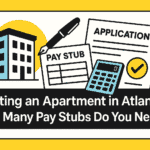
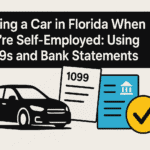


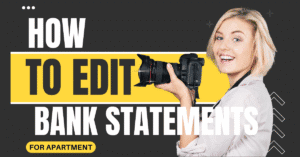
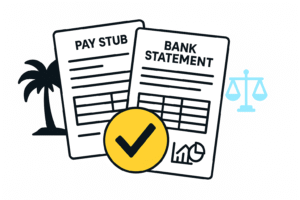
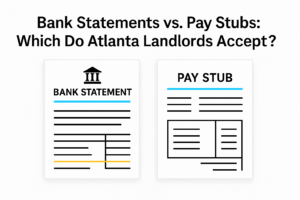
Add comment